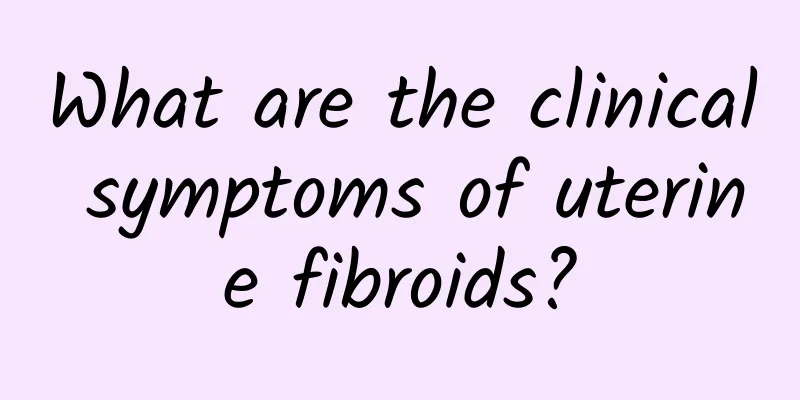What are the clinical symptoms of uterine fibroids?

|
What are the clinical symptoms of uterine fibroids? Uterine fibroids are an increasingly common gynecological disease in women in recent years. Many female friends have uterine fibroids but do not know it. Experts point out that if we can understand the symptoms of uterine fibroids, we can treat them in time and the hope of cure will be greatly increased. So what are the clinical symptoms of uterine fibroids? Experts say that the main clinical symptoms of uterine fibroids are: 1. Increased leucorrhea: Increased leucorrhea, sometimes with a large amount of purulent and bloody discharge and necrotic tissue discharge with a foul odor. 2. Secondary anemia: If the patient has excessive menstruation for a long time, it may lead to anemia, with symptoms such as general fatigue, pale complexion, and palpitations. 3. Menstrual changes: It is one of the most common symptoms, manifested as shortened menstrual cycle, increased menstrual flow, prolonged menstrual period, irregular vaginal bleeding, etc. 4. Pain: Generally, patients do not have abdominal pain, but often have lower abdominal distension, back pain, etc. When the pedicle of the subserosal fibroid is twisted, acute abdominal pain may occur. When the fibroid turns red, the abdominal pain is severe and accompanied by fever. 5. Compression symptoms: When the fibroid grows forward or backward, it can compress the bladder, urethra or rectum, causing frequent urination, dysuria or constipation. When the fibroid grows to both sides, it forms a broad ligament fibroid, which compresses the ureter and can cause hydroureter or hydronephrosis. Experts remind: If female friends find any abnormalities in their bodies and have the above symptoms of uterine fibroids, they must seek medical attention for examination and treatment as soon as possible. Only in this way can they ensure a rapid recovery of the body. Warm reminder: If you experience the above-mentioned symptoms of uterine fibroids or other discomfort, please go to a regular hospital as soon as possible. |
<<: What are the symptoms of pelvic inflammatory disease?
>>: How to regulate premature ovarian failure and menstruation at the age of 36
Recommend
Why do you feel sore in the waist and knees before menstruation?
Most women experience weakness in the waist and k...
When can I wash my hair after abortion? How many days after abortion can I wash my hair?
When can I wash my hair after an abortion? This i...
Pelvic effusion caused a mass on the left ovary
Pelvic effusion may lead to ovarian masses. You s...
What is the basic cause of hyperprolactinemia?
Prolactin is a polypeptide hormone, also called p...
What should I pay attention to when I have premature ovarian failure?
What should we pay attention to when we have prem...
Do you know who is suitable for abortion?
Do you know about abortion? Do you know who is su...
Can women really relax after menopause?
Modern life is fast-paced and stressful, and the ...
What causes cervicitis? Do patients with cervicitis have symptoms of back pain?
Cervicitis is one of the common female reproducti...
Song Hye Kyo eats tofu to lose weight, can she lose 3 kilograms in a month? Famous weight loss doctor: Eat it with egg yolk and vitamin D to make it better
When it comes to Korea's "national godde...
Experts introduce massage methods to treat dysmenorrhea
Among the various methods of treating dysmenorrhe...
What to do if the endometrium is thick
Endometrial thickening refers to the thickness of...
Among Thousand Island dressing, Caesar dressing and vinaigrette, which salad dressing is the most harmful to weight gain?
Would you like Thousand Island dressing, Caesar d...
Why do you get vaginal candidal infection?
Why do you get candidal vaginitis? There are diff...
Can people with diabetes eat hot pot? Avoid the sugar trap! Nutritionists recommend low GI soy milk pots and teach you 5 smart ways to eat pots
The temperature is low in winter and the most pop...
Can recurrent miscarriage be treated with Chinese medicine?
Physical discomfort symptoms can be treated with ...









